LORD SALISBURY AT THE GUILDHALL.
THE sentences upon Egypt which formed the principal portion of Lord Salisbury's speech at the Guildhall on November 9th, are open to the criticism that they were a trifle too energetic ; but circumstances had made energetic utterance almost indispensable. It might have been ex- pedient to add a few words expressing deep regret that any part of the inevitable policy of this country should rouse the susceptibilities of a nation with which all parties in England desire to live on terms of cordial amity ; but to expect such unusual courtesy from the Foreign Secre- tary was asking almost too much of human nature. The British Foreign Office is not only thwarted in Egypt by a Power which calls itself friendly, but it is worried, loaded with captious controversies, forbidden to make reforms which do not affect the Power forbidding, and treated altogether as a man suspected of " lurking " is treated by a serjeant of police. Foreign Secretaries are human, and it is quite possible that Lord Salisbury, while incessantly smart- ing from their stings, could not bring himself to speak of the mosquitoes with the extra suavity which the exigencies of diplomacy sometimes make wise. However that may be, it is clear that a certain firmness of speech had become imperative. Mr. Morley's recent imprudent utterance, though subsequently retracted or hedged in with reserves, had created an impression in Paris, in Constanti- nople, and in Egypt itself, that the British occupa- tion would soon terminate, that Mr. Gladstone would insist on evacuating the country at once, and that every arrangement now in force would be speedily upset. The impression was, of course, most disastrous in its effects. In Paris, the French Government grew so elated that M. Ribot publicly hinted at a scheme for the " neu- tralisation " of Egypt which he can never have thought out inasmuch as it must involve, as a condition precedent, the subjugation of Turkey, whose Sultan as Khalif can never voluntarily give up his claim to be legal Sovereign in the richest of Arab possessions. That would be handing over his sceptre to his deadly Arab foes. Yet neutralisa- tion without independence is not only impracticable, but very nearly unthinkable. In Constantinople, the Sultan, as yet unaware of M. Ribot's ideas, began to think that Egypt might some day fall to him again, and to dream dreams of palaces in Cairo, and bags of gold received from Alexandria, to be expended at his own sole discretion. In Egypt, the French colony grew excited, and eagerly discoursed to Egyptians of coming changes ; while the English officials, in deep despondency, began to feel that they were throwing away their lives on a philanthropic undertaking foredoomed to failure through the caprice of the very people who employed them. Lord Salisbury felt that the time had come to speak out, and he spoke out. Premising that the Unionist Government was not yet dead, and that, like Charles II., it ought to apologise for being so long a-dying, he expressed his belief that even if the Gladstone Government came into power,' the British people would not relinquish the work it had undertaken in the Nile Valley. The object of this country in Egypt was to stay until that country was strong enough to defy external attack, and to put down internal disturbance ; and till that object was attained, she would, Lord Salisbury said, remain. It was certainly not attained now. Much had been done, but the external dangers were still great, the internal difficulties still pressing, and till the goal had been reached, " it must be the force of another Power that would keep Egypt from slipping back into a condition exposed to the attacks of barbarians without and intriguers within, and that Power must be England."
That is plain speaking, and it instantly sent up all Egyptian securities, for such words uttered by a Premier, when they are true at least, tend to bind his people ; and all who understand Egypt know that they are true. Nothing that we have planted in Egypt has had full time to grow, and within twelve months of our departure all our reforms, including the solvency of the Treasury and regular col- lection and expenditure of the revenue, would have been swept away. The Treasury would again be plundered by every one with access to it ; the Army would again be left for months at a time unpaid ; forced labour would be reimposed under some other designation ; the peasantry would again be given up to the landholders and Pashas to be taxed to their very skins. No force would remain in the country sufficient to arrest the Mandi movement, which is the Arab movement, and with which two Egyptians in three rather sympathise than not. Not only would the old misery reappear in an exaggerated form, but the old political danger ; and Europe would again be compelled either to employ some Power as its agent, as it employed England, with the old result, the bitter jealousy either of England or of France, or to suffer the Ottomans to garrison the country and re-establish their supremacy. The Ottomans probably could perform the duty of defence, and cer- tainly would be delighted to perform it ; but they would demand, or at all events exact, their price. They would suck the life-blood of Egypt, reducing its people once more to virtual slavery, and probably provoking either an insur- rection like that of Mahommed Ali, or the great Arabian rising which it is even now so difficult to stave off. These are not prophecies, but simple statements of fact. Egypt is a great prize right under the feet of the " barbarians," and they can and will take it, unless we plant a Power there which must be either English, French, or Otto- man. As Lord Salisbury observed, no paper guarantee is of the smallest value, for it would not bind the Soudanese, who, moreover, would not pay the slightest attention to a neutralisation they could not even under- stand. Why should they care about arrangements made only for European convenience, or hesitate to advance on Cairo, unless they know that an adequate and superior force is on the spot ready to drive them back ? We may ultimately create such a force, half Egyptian and half Negro, in the Delta itself ; but if it is not to be demoralised by incessant intrigue, it must for a generation be officered by Europeans, paid by Europeans, and only employed when a European General has given his consent. A native Government, until the nature of Turkish and Egyptian Pashas is radically changed, could not keep such an army ; and the final result, if it is prematurely left to itself, will be the reoccupation of Egypt merely to preserve it from barbarian invaders. These diffi- culties will be perceptible, if not to English electors, at least to British statesmen of either side, and fully justify Lord Salisbury's belief that the country will not allow its foreign policy to be altered, or give up the finest piece of work which statesmen in this generation have set their hands to do. Why should it ? The only reason would be fear of the jealousy of France, and it has yet to be proved whether that jealousy is shared by the people who hate the notion of employing conscripts on transmarine duty, and whether it is impossible to compensate France for the loss of a " position " in Egypt which is to a large extent imaginary. It is not the Unionist interest to say so, but the enemies of England who are calculating that under a Gladstone Government all their demands would be satisfied at once, mistake not only, as Lord Salisbury says, the " play of our electioneering forces," but the temper of a people which, in Scotland especially, retains many of its old Imperial instincts. To give up the Nile, except to native and trustworthy hands, is to give up Eastern Africa ; and we shall believe in the approval of a ple'biscite when we see it, but not before.
There were only two other points in Lord Salisbury's speech which require notice. One was the rapture of applause with which his allusion to ecclesiastical dominance in Ireland was received, the cheering making one sentence actually inaudible ; and the other was his admission that even if England stood alone in repudiating Protection, she would probably adhere to Free-trade. The Premier did not defend Free-trade. He felt too tenderly, per- haps, for that faithful remnant of the old Tory Party which, while accepting Free-trade for this country, cannot but feel a certain delight in seeing nation after nation and Colony after Colony voluntarily replacing itself in anti- quated fetters. Lord Salisbury may even share that pleasure himself, as a matter of pure sentiment, though we do not know that he does ; but, like Lord Beaconsfield, he makes no mistakes as to the facts. The nations, he says, are treating the industrial competition as if it were a diplomatic affair, and their great preoccupation is the renewal or abandonment of the commercial treaties which expire next year. But though Britain may be in the position of Athanasius contra mundunt, " I have no doubt that the commercial community of this country does not falter in its attachment to Free-trade ; and I do not ascribe to it any special virtue in that respect, because the fact that the articles in respect to which we should have to exercise Protection, if we are to exercise it at all, are mainly articles of consumption bearing upon the necessities of the whole body of our population is, to my belief, an absolute guarantee that we shall never return to the ways of Protection." There never was danger of anything but a controversy here ; but it is something to see the danger even of a. sterile controversy finally dispersed.







































 Previous page
Previous page